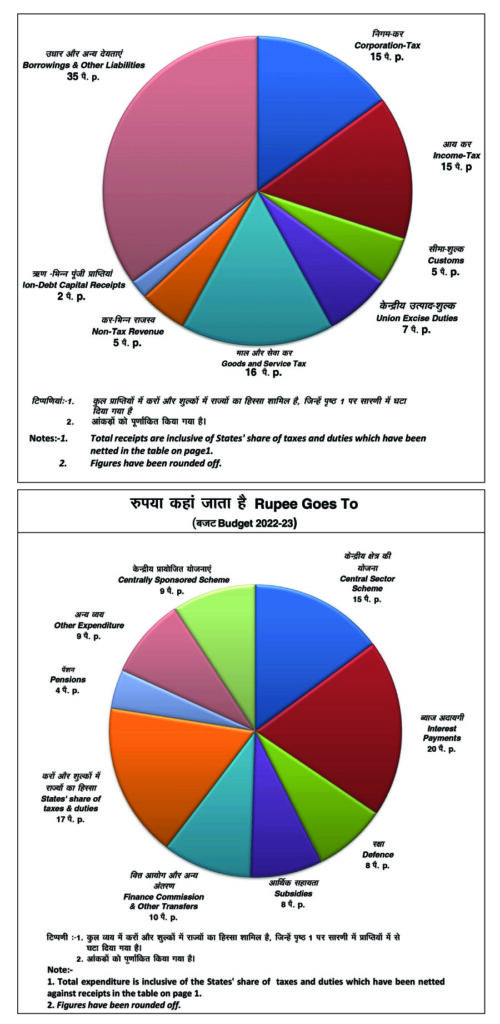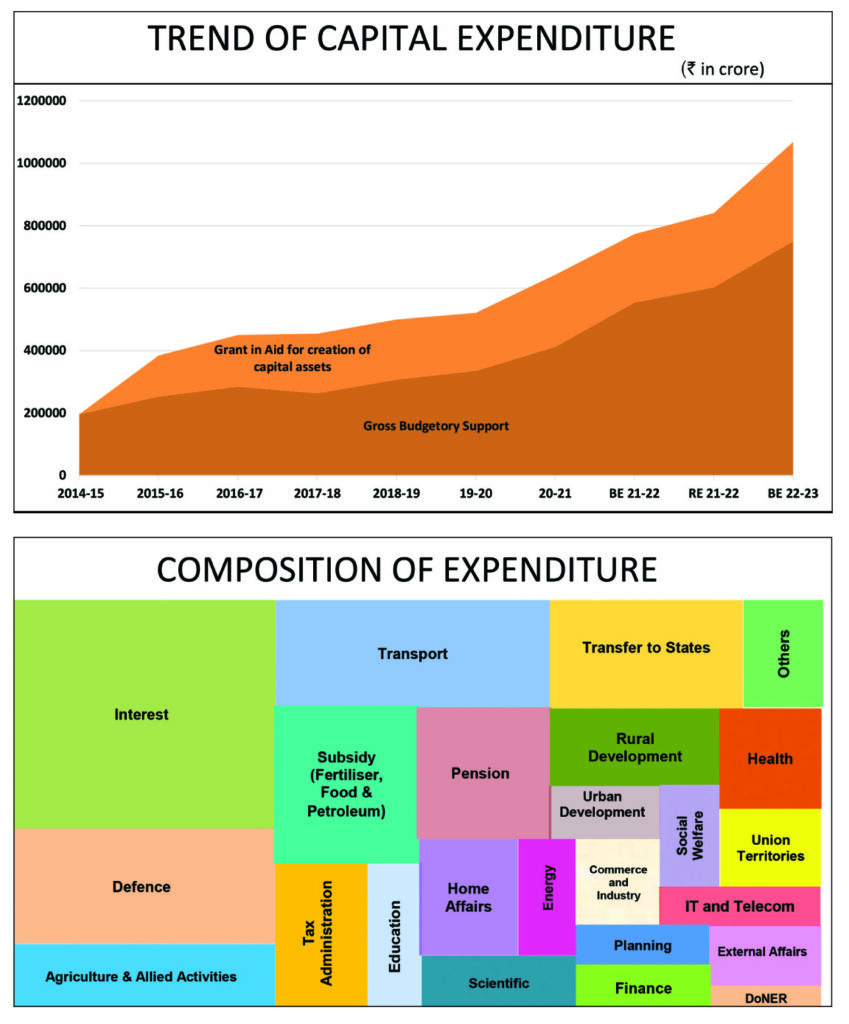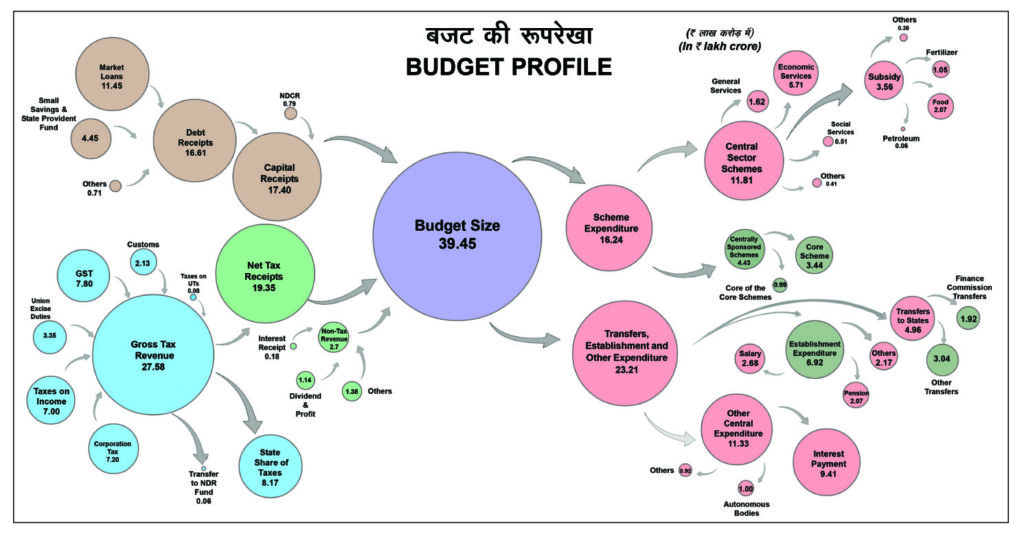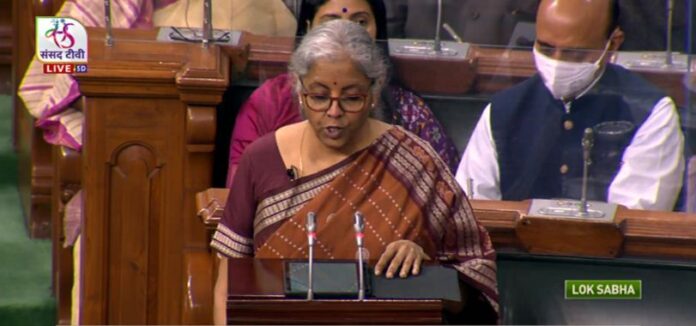By Chanakya
It is the old story of the carrot and the stick. Only, the purpose of the stick is a little different here. It hangs in a contraption tied to the shoulders of the common man, dangling the carrot in front of the poor aspirant, but just beyond his/her reach. That is called Bhavishya Darshan, the vision of the future. You can run fast on your weak knees, but your target will always be in the future.
Bhavishya, is not the truth, it is a concept. Better the political brain, better the vision of the future for the common man: in the dreams that are created. BTW Bhavishya (would you believe it?) is also the name of the Pension Sanctioning & Payment Tracking System of the government.
Keep this mind, while we discuss next year’s budget proposals as revealed in Finance Minister Nirmala Sitharaman’s 90-minute speech in Parliament on February 1.
When you look at an India 25 years hence – if you manage to last that long – you might suddenly notice that your financial position, vis-a-vis the country, remained unchanged. Do not be surprised, because the purpose of this budget is definitely add to the nation’s wealth, but is not to eradicate poverty. That is a subject which has not even been discussed in passing in the budget.


Let me be specific. This budget is a route map that should take it out of the woods. Instead, it misses the entire wood for the trees. Before going any further, let us look into a study that was conducted some time back by some American psychologists, on some sugarcane farmers in Maharashtra.
The poor never get to the carrot. The stick, though, keeps beating him down. Give the sinking man a life jacket, not a vision of the distant shore.
The basic economic structure of the sugarcane farmers is that they collect 60% of their annual income in one go. That is during harvest time. This means that they are poor before harvest and somewhat on the rich side after harvest. They live in two, sort of, extreme conditions, which made this survey easier.
The psychologists did a strange thing. They asked the farmers to take an IQ test before harvest, that is, when they are poor, and one after harvest and after they have been paid for their harvest, that is, when they are on the richer side. The result the researchers found was mind boggling.
They found that before the harvest, the farmers, almost all of them, scored poorly. They fared better after having received their payments. When poor, they seemed to have lost up to 14 points of their IQ. This is comparable to the effects of alcoholism.
What does this mean? It means that people behave differently when they are pushed in a situation of scarcity, of a situation that somewhat scares them.
The basic idea may have been that the 35% growth in capex should absorb the slack from the employment reduction in reduced allotment to NREGA
The focus of the poor is not dissipated, as we believe. In fact, it has been barrowed down to just one thing: survival. It has been barrowed down to the immediate need of providing his/her family its next meal, of being able to afford rent, of being able to clothe themselves in winter, etc. They do not have the time for fancy thoughts.
This extreme narrow thought process is not a lack of ability. In fact, it enhances the senses, as we may have found in nature, but all the senses are focused on just one or two objectives.
The test also found that the poor generally lose the ability to make informed decisions on subjects. This changes abruptly when they belly is full, when they are guaranteed a basic sustenance income and they are sure they or their families will not go hungry today or tomorrow or in the near future and that they will have a roof above their heads and clothes to wear.
They suddenly start taking decisions that are more inconsonance with logic. That is where the IQ tests show growth.


One has to realise that it has been long proved that IQ tests are not absolute. They change with profession, with circumstances, with addition of knowledge etc. now it has been proven that it changes with the financial condition of the subject.
Taking these test results further into the realm of budget proposals, one can realise why this budget is unlikely to yield the proposed results. Sure, there will be top-line growth, and sure there will be more wealth in the hands of a few, but the basic economic structure of society will end up more crippled.
No budget can be all good. That is not possible. But in these trying times, let us not show the poor a heaven they might never reach.
The positives include the humongous 35% extra capex allocation, especially for infra. The budget possibly wants to prepare us for the long haul, probably looking ahead to the 2024 general elections. The minister said the country is expected to grow at 9.27 per cent in the coming year and that this is a forward looking budget, as far as 25 years ahead.
That feels so good, till you realise that the finance minister had virtually glossed over the pain of the gasping MSMEs, of the farmers, and of most of those displaced in the pandemic.
So how does a pyramid stay steady and balanced, when its base is shaky? What stopped the finance minister from addressing the immediate needs of the common man? The test result as above, meant that it was essential for the FM to put money directly in their hands. That would not only have boosted general consumption, but also allowed these people to re-establish themselves within society.
As far as MSMEs go, is there any point in extending the Emergency Credit Line Guarantee Scheme (ECLGS) till 2023 when what they really need now is life-saving oxygen? What good will more credit do to a company that does not have the capacity to take in more credit? Companies are finding it extremely difficult to service existing credit, if any.
More important was to assure for them good orders, timely payments, and a supply line that gives them breathing space. Hand-holding was necessary, not pictures of a distant, rosy future.
There was one positive that one cannot overlook. This was of the massive infra push. Apart from infra growth, here is one way it can help the poor. There has been a fall in NREGA allocation. The allocation for the next financial is Rs 73,000 crore, 25% lower than the Rs 98,000 crore revised estimate for the scheme in the current year.
But when the government is committed to a mega push for PM GatiShakti projects, such as 25,000 more of highways and 400 more Vande Bharat trains etc., they should automatically take up the NREGA slack. After all, infra is the biggest blue collar employer of any developingcountry.
The overall outlook could be different, considering which side of the prism you are looking through. No budget can be all good. That is not possible. But in these trying times, let us not show the poor a heaven they might never reach. Let us not heap more indirect taxes on them – the GST increases ensure that – so that they suffocate. Remember, when they are focused narrowly on the very basics, such as hunger, they become unproductive. The tests proved that.


What will the government do with a 10% productive population when the rest are just struggling to kleep their heads above water? That is not growth, that is not welfare, that is definitely not good goevrnnance.
Hope there are some decisions taken post budfget, so this anomaly is corrected.





















